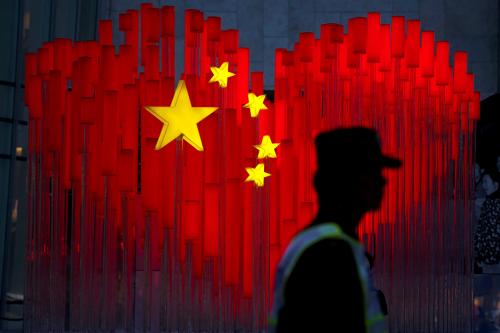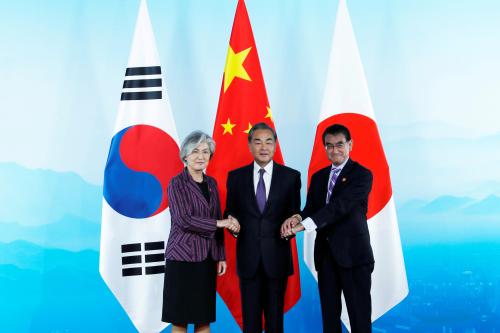“For Beijing, international relations is about hierarchy and big-makes-right,” remarked Assistant Secretary of State for the Bureau of East Asian and Pacific Affairs David Stilwell on December 2 at the Brookings Institution. The discussion focused on China’s ambitions and different tactics in East Asia, part of Brookings Foreign Policy’s Global China initiative. The event featured welcoming remarks by Brookings Foreign Policy Vice President Bruce Jones, a keynote address by the assistant secretary, and a moderated conversation with Senior Fellow Michael O’Hanlon. The second portion featured a panel discussion with authors of the papers led by David M. Rubenstein Fellow Lindsey Ford.
The theme of pluralism, characterized by freedom of choice and sovereignty, was emphasized throughout Assistant Secretary Stilwell’s speech. Despite its imperfections, he stated, overall, this vision “has been a stunning success” in bringing about peace and prosperity in a post-war global rules-based order. Assistant Secretary Stilwell contrasted the notion of sovereign autonomy, where countries are free from domination or coercion, with the “increasing authoritarianism” that is reflected in China’s governance ideas today. Reiterating America’s robust commitment to the security and prosperity of a multi-polar region, which the administration believes yields the “greatest good to the most people,” the assistant secretary urged better alignment and cooperation among allies in the Indo-Pacific.
The panel discussion that followed addressed the different aspects of Beijing’s relationships and tactics in East Asia and the common themes that have emerged.
Brookings Senior Fellow Richard Bush spoke about Taiwan’s existential challenge of maintaining democracy in the face of Beijing’s determined pursuit of unification, including through use of political influence, coercion, and intimidation tactics. Using Taiwan as a testing ground for China’s influence tactics, Bush assessed that the outcome of January 2020’s presidential election will have huge implications for the island. Furthermore, the lessons learnt from Beijing’s operations could be reexported and applied to other countries in the region.
Nonresident Senior Fellow Evans Revere pointed out that, after a serious downturn in 2016-17, China’s relationship with North Korea has now been reinvigorated. In his view, the distrust and disagreements that continue to underlie China’s complicated relationship with this nuclear state are an exception and should not be used to draw comparisons to how China manages relationships with neighbors in its periphery.
Senior Fellow Jonathan Stromseth illustrated China’s renewed interest in the Southeast Asia region. He described China’s expanding use of both inducements and pressure. While Stromseth discussed how Southeast Asia looms large as a testing ground for China’s development as a great power, he also highlighted that countries such as Vietnam and Indonesia are exercising agency to benefit economically from Belt and Road Initiative projects, even as they seek to balance relations between regional powers.
On the South China Sea question, former Nonresident Senior Fellow Lynn Kuok stated that China’s assertions of maritime and territorial rights over contested features is undermining international law. Kuok argued that this should be a cause of concern for the international community, not least because the sovereignty of the disputed features has not been resolved. Kuok also observed that China is conducting influence operations to affect domestic opinion within states that challenge China’s territorial claims, in addition to employing intimidation tactics against its neighbors.
Taken together, these presentations highlighted China’s expanding use of inducements, interference, and threats in its efforts to compel neighboring countries to accede to China’s interests. That this pattern of Chinese behavior has coincided with its rise in national power raises fundamental questions about the future character of Chinese behavior in the Indo-Pacific region.





Commentary
Highlights: Assessing China’s role in East Asia
December 12, 2019